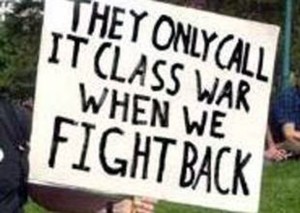
If I don’t have it, why should you?
It’s the basis of the resentment I hear and see on the part of people who snarl about those unions (who get so! much!) those striking Verizon workers, those students on the J-1 visa, teachers, public service workers, and others. Instead of thinking, “Hey, that’s fucked. We should both make a living wage and be treated with dignity and respect by the places we work for, your fight is my fight,” a lot of people seem to think, “Why should you get this when I don’t?” or “You should be grateful for what you have.”
One thing that struck me about the foreign exchange student protest in Pennsylvania is that they were quite clear in their desire to not take jobs away from Americans. Our fight, as far as they were concerned, is their fight. They’re linked.
So when I hear lectures from yet another person who embraces Voluntary Simplicity (something I practice as well, by the way, though I am ambivalent about some aspects of it), I have to roll my eyes at the preaching–“You all are too materialistic. The people in many Global South nations are poor but happy.” And I think to myself, Really? Have you been to an EPZ? I mean, without the official minders flanking you? Have you actually bothered to talk to some of the people there, who are trying to unionize in the face of sometimes brutal repression?
I think sometimes it’s too easy to snark on people and roll our eyes when we perceive ourselves as having less. But the thing is–like with the Verizon workers–what works for one person doesn’t necessarily work for another, and a living wage is more than the bare bones minimum. These jobs are not easy, the people who do them work hard, and it should make us all livid when pundits declare that CEO’s make so much because they work hard (and imply that the striking workers–or any worker–isn’t working hard and that’s why they aren’t making about $6M a year in salary and bonuses). I mean, not for nothing, but the people who teach our kids work hard, the nurses and assistants who care for us in the hospital are working their tails off, the people who pick up our trash and vacuum our offices are not exactly slacking, and the people who ring up our sales and make our coffee do not have what I’d call cushy jobs.
What you get when you point this out is a boatload of contempt–These people could just start their own business, and then they’d be fine. They should work harder! They all have flatscreen TV’s and rip off the system–I know because my sister’s coworker’s cousin saw someone buy steak with their food stamps five years ago. I don’t have the pay they want/their benefits/their job protection, so why should they?
It’s another side to the “I got mine, so screw you,” attitude that poisons the atmosphere. These folks who complain so bitterly about these supposedly spoiled workers never bother looking at the C-level executives, who make millions (I am not exaggerating. Check out their proxy statements sometime–it is eye-opening.) and who get very generous exit packages when they’re fired. The pay of CEO’s went up 27% in 2010, compared to 2% for the average worker. And they aren’t taxed at a particularly high rate on their stock assets or stock sale profits, which are classed under capital gains taxes (which have been slashed since the Regan era). The ultra-wealthy aren’t paying nearly the percentage that any of us do, and asking that they start is making conservatives in the US hyperventilate. Oh, it’s fine for us to pay our share, but it’s horrible and awful to ask that someone who’s making six or seven figures to do the same.
It used to be that US citizens prided themselves on the fact that you could build a good life for yourself–work hard and save, and you could have a decent quality of life. But no more–our income disparity is growing here–and nothing good ever comes from such severe wealth inequality. You want to hear people singing The Internationale? Keep that shit up.
Now, I suppose that makes me a class warrior. Which is funny, since I’m seeing a class war, but it’s more of an all-out attack on poor, working-class, and even middle-class people. And if we want a more just and a more equitable society, we have to know that we cannot stop striving for that if we get a victory for ourselves. As long as working-class people are squeezed out of jobs and denied the right to collectively bargain, my life and my security is at risk. As long as poor people are shamed and vilified for being poor, we’re all at risk for being cast out the minute something catastrophic happens, we lose our money, and we make one “unwise” choice.